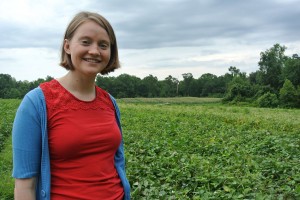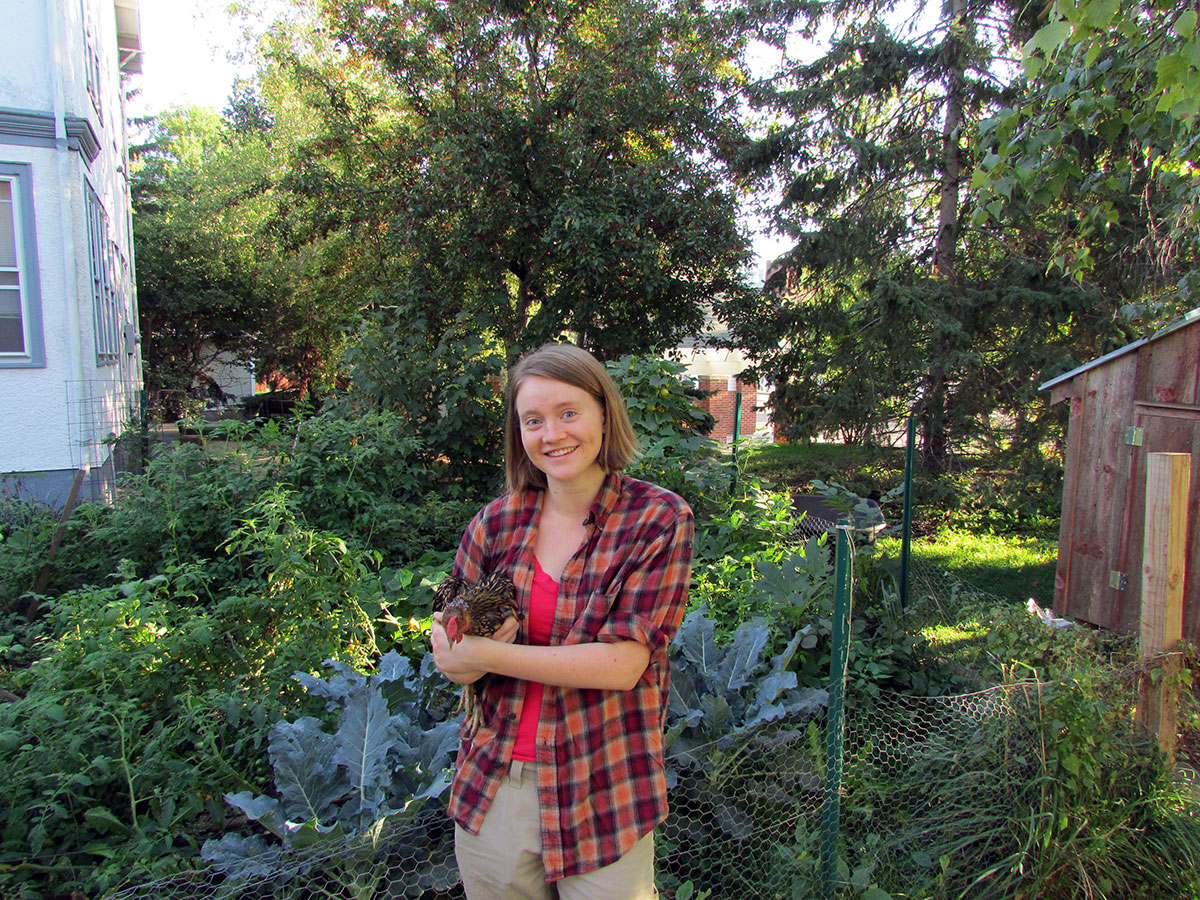Introducing Amanda Wareham: From Dairy Farm to Food Movement Activist
Editor’s Note: Please welcome Amanda Wareham, who replaces Alyse Festenstein as the Bon Appétit Management Company’s Midwest Fellow. (Alyse, we’re happy to say, remains with Bon Appétit as manager of community partnerships for our Emory University team.)
 Growing up around my grandparents’ traditional dairy farm, I had different experiences of external and internal worlds than the average millennial kiddo.
Growing up around my grandparents’ traditional dairy farm, I had different experiences of external and internal worlds than the average millennial kiddo.
As a child, I spent a majority of my time playing on my family’s 400-acre farm with our family dog, and rifling through the hay mow in search of newborn barn cats. I had a mystical fascination with watching the cows graze in the field. Their curiosity matched and sometimes exceeded my own. Yet I perceived a gaping divide between the way we treated our dogs, cats, and horses, and the inevitable journey of those cows to our plates.
My grandparents were dumbfounded by my seemingly innate vegetarianism, but years passed before it was referred to as anything other than “extreme picky eating.” Some family members were persistent in their efforts to diversify my diet, while my parents tried to bribe me with an allowance boost. But my willfulness wasn’t a misstep on the path to maturity and adherence to the conventional American diet — it was a precursor to my deep concern for the planet, the impacts of our agricultural system, and the effects of food on our bodies.
In high school, I began to research the industrial agricultural system. The lives of animals on factory farms stood in stark contrast to those of the free-range chickens and grass-fed cows I grew up with. Suddenly, I felt compelled not only to remove myself from this system, but also to find a way to change it. On my first visit to the Midwest, I met a vegan couple during a canoe trip on Lake Superior. After traveling through the agricultural fields of Minnesota, the most poignant content of the documentary Earthlings still buzzing in my head, meeting these two inspired individuals in such remote wilderness felt like a fortuitous event. Changed, I transitioned to a vegan lifestyle a few months later. My exploration of veganism in small-town America, combined with my ever-present food sensitivities, made me incredibly aware my immediate community’s perceptions of my decision, as well as our emotional connections to food and eating.
 Entering college at Macalester College in St. Paul, MN, I found a community that pushed me harder to consider the ethics behind my decisions and gave me an exercise in articulating them effectively. With Bon Appétit as Macalester’s foodservice provider, I was introduced to vegan options that not only sustained me, but rekindled my excitement about vegan cooking. Throughout my four years at Macalester —working in biology labs, an environmental non-profit, at a nature preschool, a field museum, our school garden, and at our beautiful field station — I could finally fully contextualize the sensitivities I had developed as a child. Growing up on my family’s farm had given me a deep reverence for farming, but it had also highlighted a number of incongruities between the idealized farming life that exists in the minds of many Americans and the industrialized system that tills that very image under, creating a disconnect between people and the process behind our food.
Entering college at Macalester College in St. Paul, MN, I found a community that pushed me harder to consider the ethics behind my decisions and gave me an exercise in articulating them effectively. With Bon Appétit as Macalester’s foodservice provider, I was introduced to vegan options that not only sustained me, but rekindled my excitement about vegan cooking. Throughout my four years at Macalester —working in biology labs, an environmental non-profit, at a nature preschool, a field museum, our school garden, and at our beautiful field station — I could finally fully contextualize the sensitivities I had developed as a child. Growing up on my family’s farm had given me a deep reverence for farming, but it had also highlighted a number of incongruities between the idealized farming life that exists in the minds of many Americans and the industrialized system that tills that very image under, creating a disconnect between people and the process behind our food.
As I moved closer to the end of my college career, questions of how to create change in the food system tumbled about in my brain. During my senior year, I became involved with Food Recovery Network. This brilliantly simple nonprofit is a fantastic example of social entrepreneurship. For me, it redefined the term “entrepreneurship” and clarified the practical application of capitalism to create and enforce socially responsible and sustainable policies. Perhaps most importantly, my experience with Food Recovery Network introduced me to a passionate team of people committed to sustainability. The amount of food donated from Macalester’s kitchen was small in scale, but it provided solid purpose and a clear impact in pounds recovered and people served.
As I join Bon Appétit, I’m excited to continue the conversation around food and food justice on college campuses where I refined my own convictions. Food matters, people matter, animals matter, and our shared passion to change the status quo in the foodservice industry continually changes the world that we operate in. Approaching these issues with humbleness and acknowledgment of our own emotional and logical food choices can create meaningful and hopefully pivotal discussions about our food system.